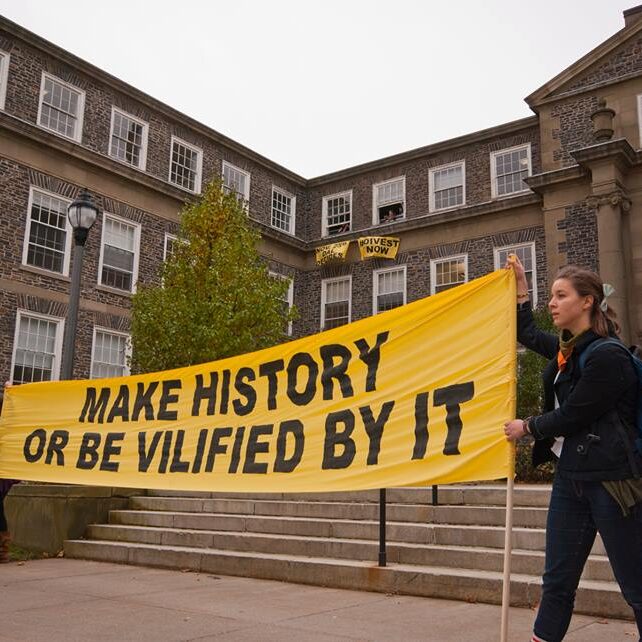
Is Dal as invested in you as you are in Dal?
Attending university is an investment in our future—so Dalhousie should not invest in companies that endanger that future.
Tuition is rising.
Our parents’ generation only paid a fraction of what we do, and tuition currently sits at triple what it was in the 1990s.
That said, a university education can still be one of the best ways to improve your career prospects.
Personally, I would argue that it’s also one of the best ways to invest in yourself. Lessons learned at university go far beyond the classroom; schools like Dalhousie can be a model of cooperation, knowledge sharing and the pursuit of what is right.
As longstanding institutions of critical thinking, universities are uniquely positioned to speak on issues with a moral authority. That is why it matters when professors lecture on topics like environmental racism and when university scientists speak out for their muzzled government counterparts.
Students draw inspiration from acts like these, but such acts shouldn’t end with the professors. Learning opportunities are possible at all levels of the university, including the administration, and it is lessons like these that can make an investment in university education worthwhile.
This raises the question: how is Dalhousie responding to its unique position as a leader? What does this mean in a Nova Scotian, Canadian or even global context? And what are students getting out of this?
When it comes to environmental sustainability, the university is happy to show of its new (IDEA) ‘learning commons’ and its spiffy new LEED candidate status. But behind that is an institution that rolls over for industries and squashes the mosaic of concerns from students and professors alike.
It does not take much effort to find publicly accessible university documents that show the fabric of our institution is unsustainable in many respects. An easy target: Dal’s investment policy is a prime example of contradiction in action.
To look at all the companies with questionable profit motives would be exhaustive, but for the point of this article we’ll focus on two. Included in our endowment’s investment portfolio (about $535 million) are both Shell and Exxon Mobil, two companies whose continued success will have unprecedented impacts on the climate.
Both companies have worked to silence evidence that shows climate change is going to be catastrophic unless 80% of known oil reserves are kept in the ground. Despite these findings, Shell plans to expand its operations to include arctic offshore drilling, even amid growing resistance to arctic programs.
Even more scandalously, Exxon acknowledged climate change in 1981 and then proceeded to fund climate deniers for almost 30 years, all while the climate crisis mounted to the detriment of (now) current and future generations.
To their credit, Dalhousie has chosen its path honestly. In the case of its action on climate change, the institution bleeds black and gold. Although Dal strives to be shiny and green with its new building (LEED Gold), it is the investment policy that falls extremely short of the mark. When it comes to making meaningful institutional change, until now the black of oil and coal spoke louder than investments in the future.
Dalhousie could be a sustainability leader (as is advertised) but is failing to reach that potential by saying to its students that endowments are sacred and change is difficult. The school’s most trusted decision makers have said, many times, that even unsubstantiated claims of risk to the academic mission should prevent action on climate change. This isn’t leadership; this is the same type of hesitance and institutional defense of the status quo that caused the climate crisis.
So what is that teaching Dalhousie graduates? It teaches that finance can be separated from sustainability. It teaches that it’s what the university says that’s important, not what the university does. And ultimately it demonstrates that sacrifices now, although possible, are not worth contributing to a better world down the road.
Divestment from fossil fuels is part of the solution to this injustice. Every student attending university knows that a little hard work in the present will be worth the future payoffs.
Students in their first year (or even students considering Dalhousie) should reach out to President Florizone (@dalpres) as well as the rest of the administration and make sure the university is ready to invest in the future as much as they are.






